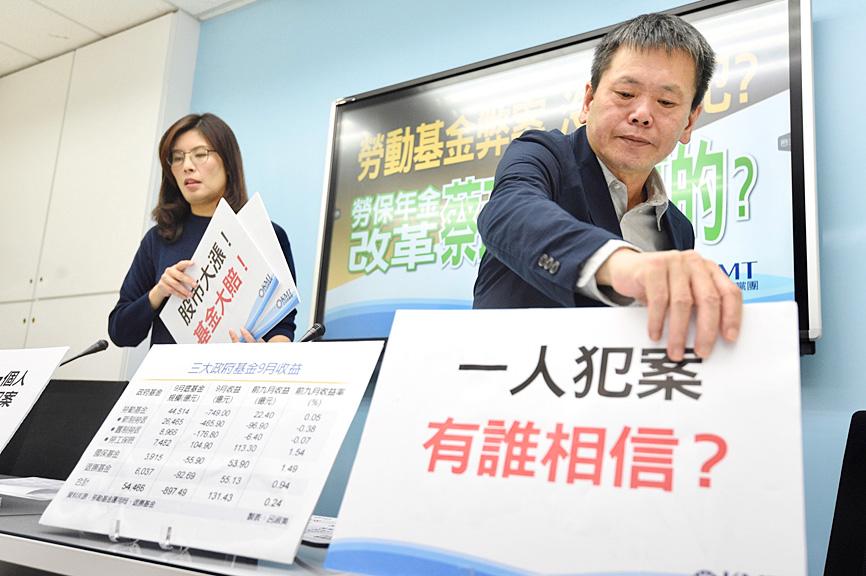Considering the low position of the initial suspect in an alleged stock manipulation scheme at the Ministry of Labor (MOL), Chinese Nationalist Party (KMT) lawmakers yesterday asked whether other ministry officials were involved and called for a thorough report on the labor fund portfolio.
Yu Nai-wen (游迺文), head of the domestic investment division of the ministry’s Bureau of Labor Funds, was on Friday detained on suspicion of accepting bribes to ask securities brokers contracted by the bureau to purchase certain stocks using ministry funds.
The bureau is the ministry’s unit in charge of the labor pension, labor insurance and employment insurance funds, as well as the funds related to occupational hazard protection and the disbursement of unpaid wages.

Photo: George Tsorng, Taipei Times
KMT caucus whip Lin Wei-chou (林為洲) said that the value of the labor fund rose 11.81 percent last year, recording a total profit of NT$473.49 billion (US$16.43 billion at the current exchange rate).
However, from January to September this year, the fund has only made NT$2.24 billion, a yield of 0.05 percent, he said.
In September alone, it lost NT$74.9 billion, as the NT$2.2 billion it posted in earnings that month was a far cry from the NT$77.1 billion it collected in August, he added.
The bureau must adhere to the principles of caution, transparency, efficiency and reliability to ensure stable long-term income, Lin said.
However, considering that one of its officials is suspected of taking bribes and colluding with a private firm, there are clearly major loopholes in the bureau’s internal oversight mechanism, he said.
The KMT caucus called on the ministry to report to the Legislative Yuan on its holdings and trading activity as soon as possible for the sake of the nation’s workers.
The report should include the traders involved in handling the ministry’s three main funds, the external advisers it consults, the securities firms it works with, portfolio contents and trading activity, it said.
KMT Legislator Cheng Li-wun (鄭麗文) said that despite Yu’s arrest, major questions about the case remain.
Management of the fund has been severely incapacitated, Cheng said, adding that Minister of Labor Hsu Ming-chun’s (許銘春) explanation was unacceptable.
The fund performed terribly in September, despite a stock market rally fueled by US monetary easing, she said.
“What kind of investment portfolio would lose NT$74.9 billion when the broader market performed so well?” she asked.
The ministry’s internal oversight is entirely broken, she said, calling for a report on all investment decisions.
“The contents of the ministry’s portfolio must be laid out in the sun for all workers to see,” she said, demanding that officials take responsibility for the incident.

Alain Robert, known as the "French Spider-Man," praised Alex Honnold as exceptionally well-prepared after the US climber completed a free solo ascent of Taipei 101 yesterday. Robert said Honnold's ascent of the 508m-tall skyscraper in just more than one-and-a-half hours without using safety ropes or equipment was a remarkable achievement. "This is my life," he said in an interview conducted in French, adding that he liked the feeling of being "on the edge of danger." The 63-year-old Frenchman climbed Taipei 101 using ropes in December 2004, taking about four hours to reach the top. On a one-to-10 scale of difficulty, Robert said Taipei 101

Taiwanese and US defense groups are collaborating to introduce deployable, semi-autonomous manufacturing systems for drones and components in a boost to the nation’s supply chain resilience. Taiwan’s G-Tech Optroelectronics Corp subsidiary GTOC and the US’ Aerkomm Inc on Friday announced an agreement with fellow US-based Firestorm Lab to adopt the latter’s xCell, a technology featuring 3D printers fitted in 6.1m container units. The systems enable aerial platforms and parts to be produced in high volumes from dispersed nodes capable of rapid redeployment, to minimize the risk of enemy strikes and to meet field requirements, they said. Firestorm chief technology officer Ian Muceus said

MORE FALL: An investigation into one of Xi’s key cronies, part of a broader ‘anti-corruption’ drive, indicates that he might have a deep distrust in the military, an expert said China’s latest military purge underscores systemic risks in its shift from collective leadership to sole rule under Chinese President Xi Jinping (習近平), and could disrupt its chain of command and military capabilities, a national security official said yesterday. If decisionmaking within the Chinese Communist Party has become “irrational” under one-man rule, the Taiwan Strait and the regional situation must be approached with extreme caution, given unforeseen risks, they added. The anonymous official made the remarks as China’s Central Military Commission Vice Chairman Zhang Youxia (張又俠) and Joint Staff Department Chief of Staff Liu Zhenli (劉振立) were reportedly being investigated for suspected “serious

Nipah virus infection is to be officially listed as a category 5 notifiable infectious disease in Taiwan in March, while clinical treatment guidelines are being formulated, the Centers for Disease Control (CDC) said yesterday. With Nipah infections being reported in other countries and considering its relatively high fatality rate, the centers on Jan. 16 announced that it would be listed as a notifiable infectious disease to bolster the nation’s systematic early warning system and increase public awareness, the CDC said. Bangladesh reported four fatal cases last year in separate districts, with three linked to raw date palm sap consumption, CDC Epidemic Intelligence